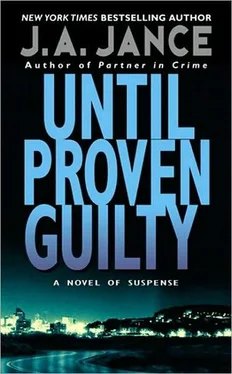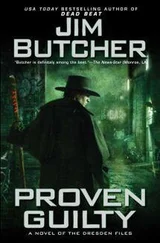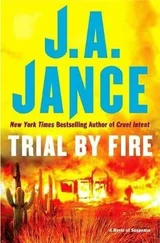J. Jance - Until Proven Guilty
Здесь есть возможность читать онлайн «J. Jance - Until Proven Guilty» весь текст электронной книги совершенно бесплатно (целиком полную версию без сокращений). В некоторых случаях можно слушать аудио, скачать через торрент в формате fb2 и присутствует краткое содержание. Жанр: Детектив, на английском языке. Описание произведения, (предисловие) а так же отзывы посетителей доступны на портале библиотеки ЛибКат.
- Название:Until Proven Guilty
- Автор:
- Жанр:
- Год:неизвестен
- ISBN:нет данных
- Рейтинг книги:4 / 5. Голосов: 1
-
Избранное:Добавить в избранное
- Отзывы:
-
Ваша оценка:
- 80
- 1
- 2
- 3
- 4
- 5
Until Proven Guilty: краткое содержание, описание и аннотация
Предлагаем к чтению аннотацию, описание, краткое содержание или предисловие (зависит от того, что написал сам автор книги «Until Proven Guilty»). Если вы не нашли необходимую информацию о книге — напишите в комментариях, мы постараемся отыскать её.
Until Proven Guilty — читать онлайн бесплатно полную книгу (весь текст) целиком
Ниже представлен текст книги, разбитый по страницам. Система сохранения места последней прочитанной страницы, позволяет с удобством читать онлайн бесплатно книгу «Until Proven Guilty», без необходимости каждый раз заново искать на чём Вы остановились. Поставьте закладку, и сможете в любой момент перейти на страницу, на которой закончили чтение.
Интервал:
Закладка:
J.A. Jance.Until Proven Guilty
Chapter 1
She was probably a cute kid once, four maybe five years old. It was hard to tell that now. She was dead. The murder weapon was a pink Holly Hobbie gown. What little was left of it was still twisted around her neck. It wasn’t pretty, but murder never is.
Her body had rolled thirty feet down a steep embankment from the roadway, tossed out like so much garbage. She was still tangled in a clump of blackberry bushes when we got there. As far as I could see, there was no sign of a struggle. It looked to me as though she had been dead several hours, but a final determination on that would have to wait for the experts.
My name is Beaumont. I’ve been around homicide for fifteen years, but that doesn’t mean I didn’t want to puke. I was careful not to think about my own kids right then. You can’t afford to. If you do, you crack up.
My partner, Ron Peters, was the new man on the squad. He had only been up from burglary a couple of months. He was still at the stage where he was long on homicide theory and short on homicide practice. This was his first dead kid, and he wasn’t taking it too well. He hadn’t come to terms with the idea of a dead child as evidence. That takes time and experience. His face was a pasty shade of gray. I sent him up to the road to talk to the truck driver who had called 911, while I prowled the crime scene along with a small army of arriving officers.
After the pictures, after the measurements, it took the boys from the medical examiner’s office a good little while to drag her loose from the blackberry bushes. If you’ve ever tried picking blackberries, you know it’s easy enough to get in but hell on wheels to get back out. By the time they brought out the body bag, I was convinced we weren’t going to find anything. We slipped and slid on the steep hillside, without finding so much as a gum wrapper or an old beer can.
I climbed back up and found to my relief that I had waited long enough. The swam of killer bees that calls itself Seattle’s press corps had disappeared with the coroner’s wagon. I like reporters almost as much as I like killers, and the less I have to do with them, the better off I am.
Peters’ color was a little better than it had been. He was talking with a man named Otis Walker, who was built like an Alaskan grizzly. In the old days people would have said Walker drove a sewage truck. These are the days of sanitary engineers and environmentalists, so Walker told us he drove a sludge truck for the Westside Treatment Center. That may sound like a high-class detox joint, but it isn’t. A rose by any other name may smell as sweet, but if it looks like a sewage plant and smells like a sewage plant, that’s what I call it.
However, Otis Walker had a heavy, square jaw and a nose that showed signs of more than one serious break. His biceps resembled half-grown trees. I chose not to debate his job title. Despite his fearsome appearance, he was having a tough time talking to Peters. The words stuck in his throat, threatening to choke him.
“You gonna catch that SOB?” he asked me when I appeared over Peters’ shoulder. I nodded. “I got a kid of my own at home, you know,” he continued, “almost her age. Wears the same kind of gown. Shit!” He stopped and swiped at his face with the back of one meaty paw.
“That’s our job,” I told him. I wondered what kind of murder this was. The easiest ones to solve are the hardest ones to understand, the husbands and lovers and wives and parents who murder people they ought to cherish instead of kill. The random killers, the ones who pick out a victim at a football game or a grocery store, are easier to comprehend and harder to catch. That’s the problem with homicide.
I turned to Peters. “You about done here?”
He nodded. “Pretty much.”
Walker pulled himself together. “You guys through with me?”
“For right now,” Peters told him, “but don’t go out of town without letting us know where to find you. With all this timely-trial crap from the Supreme Court, we may need to get ahold of you in a hurry.”
Walker looked dolefully at the blackberry clump halfway down the hill. He shook his head. “I wish I never saw her,” he said. “I wish I’da just driven past and never knew she was down there, know what I mean?” He climbed back into the huge blue tractor-trailer and started it, waving halfheartedly as he eased past where Peters and I were standing.
“What now?” Peters asked.
“Not much doing here as far as I can tell. Let’s go get something to eat and come back for another look later.” The call had come in about eleven in the morning. It was now well after three. I’m one of those guys who has to have breakfast, lunch, and dinner, or I begin to foam at the mouth. I was getting close.
Peters gave me a reproachful look. “How can you think about food? Where are her parents? The medical examiner says she died sometime around nine or nine-thirty. Someone should have come looking for her by now.”
“Somebody will come,” I assured him. “With any kind of luck it will be after we finish eating.” As it turned out, they found us before we even got out of the car in the parking lot at G.G.“s. A marked patrol car pulled up beside ours. The officer rolled down his window. His name was Sanders. I had seen him around the Public Safety Building on occasion.
“What have you got?” I asked him.
“Missing child,” he replied. “A girl. Five years old.”
“Brown hair, in braids?” I asked him. “Holly Hobbie nightgown, pink?”
He nodded. “The call came in a little over half an hour ago. I went to check it out before calling you guys in. It could have been someone who forgot to come home for lunch.”
“She missed lunch, all right,” I told him. “And it looks as though we will too. What’s the address?”
“Gay Avenue,” he answered. “Forty-five forty-three. I’ll lead you there.”
Peters wheeled out of the parking lot behind the patrol car. “Why the hell didn’t someone call us right away?” he muttered. “We could have been there a long time ago.”
Peters sometimes reminds me of an Irish Setter — tall, reddish hair, good-looking, loose-jointed, not too bright at times. “Calling us on the radio would have been as good as taking out a full-page ad in the Post-Intelligencer ,” I told him. “We just got rid of that mob of reporters, remember?”
Peters’ jawline hardened, but he said nothing. Our partnership was still new and relatively uneasy. We drove through Magnolia without the fanfare of lights and sirens.
Magnolia is set apart from the rest of Seattle by a combination of waterways and railroad tracks. On this warm day in late April, flowers in well-manicured lawns were just coming into their own. Magnolia is mostly an older, settled, residential neighborhood. Some of the houses are stately mansions with white columns and vast expanses of red brick. I think I had a preconceived notion of the kind of house we were going to, but I was in for a rude awakening. Gay Avenue was anything but gay in every sense of the word.
The patrol car led us to a hidden pocket of poverty just off Government Way a few blocks east of the entrance to Discovery Park. The house at 4543 Gay Avenue was a ramshackle two-story job that had formerly been someone’s pride and joy. It had fallen on hard times. Once-white shingles had deteriorated to a grubby gray. Here and there a missing one gaped like a jagged, broken tooth. Two giant stubs of trees gave mute testimony that there had once been a front yard. Yellowed newspapers and old tires littered the weedy grass. It was a perfect example of low-rent squalor plunked down in an otherwise acceptable neighborhood. If I had been one of the neighbors, I would have considered suing whoever owned that eyesore.
Читать дальшеИнтервал:
Закладка:
Похожие книги на «Until Proven Guilty»
Представляем Вашему вниманию похожие книги на «Until Proven Guilty» списком для выбора. Мы отобрали схожую по названию и смыслу литературу в надежде предоставить читателям больше вариантов отыскать новые, интересные, ещё непрочитанные произведения.
Обсуждение, отзывы о книге «Until Proven Guilty» и просто собственные мнения читателей. Оставьте ваши комментарии, напишите, что Вы думаете о произведении, его смысле или главных героях. Укажите что конкретно понравилось, а что нет, и почему Вы так считаете.












